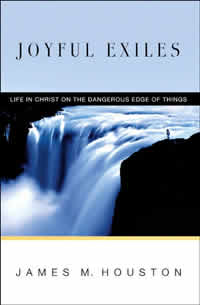Book Notes
 James M. Houston, Joyful Exiles; Life in Christ on the Dangerous Edge of Things (Downers Grove: InterVarsity Press, 2006), 204pp.
James M. Houston, Joyful Exiles; Life in Christ on the Dangerous Edge of Things (Downers Grove: InterVarsity Press, 2006), 204pp.
"Exile has certainly been part of my family's narrative," writes James Houston. After twenty-five years at Oxford University as a student and then a tutor, Houston uprooted his wife and four teenagers to become the founding principal of Regent College in Vancouver. That was thirty-five years ago. Now in his mid-eighties, with forty books under his belt and a lifetime of Christian wisdom to share, Houston wrote this book for his son who asked him to "write out the basic convictions I have sought to live out in my Christian faith." The six essays are organized into three parts: Christian Faith as a Way of Life and a New Identity, The Priority of Personal Calling Over Institutional Life, and then Maturing in Community, Transmitting Faith in Person.
Houston takes his title from a line of Robert Browning, "our interest's on the dangerous edge of things." Unfortunately, many Christians and much of Christendom play it safe. Throughout the six essays Houston laments the professionalization of the clergy and its scholars at the expense of service, careerism over calling, conventional morality over radical discipleship, technical means that eclipse moral ends, and triumphalism rather than repentance. In his view, "the Christian life is truly scandalous to the world." Believers, by definition, must be counter-cultural pilgrims, strangers, and exiles who are nevertheless confident and joyful. We must rediscover a genuinely Christian identity in a pseudo-Christian church and culture. In the words of GK Chesterton, "our perennial spiritual and psychological task is to look at things familiar until they become unfamiliar again."
I especially enjoyed Houston's story-telling—about his own life, the people he's known (CS Lewis, Nicholas Zernov, Polanyi, etc.), the poetry he loves (George Herbert and Dante), and the author-mentors to whom he returns again and again (Dostoyevsky and Kierkegaard). He also does a fine job of walking the thin line between bold affirmation and critical caution. The Christian life, for example, is hidden but not privatistic, visionary but wary of self-delusion, transformative but patient because change comes ever so slowly, joyful but fully engaged with the woes of the world, and so on. Near the end of his earthly pilgrimage, and after a lifetime of rigorous study among some of our best Christian scholars, Houston affirms that people are more important than ideas, and that Christian faith belongs to the "amateurs" and the "dilettantes" who "take delight in God" rather than to the so-called experts. That's a cause for joy.


